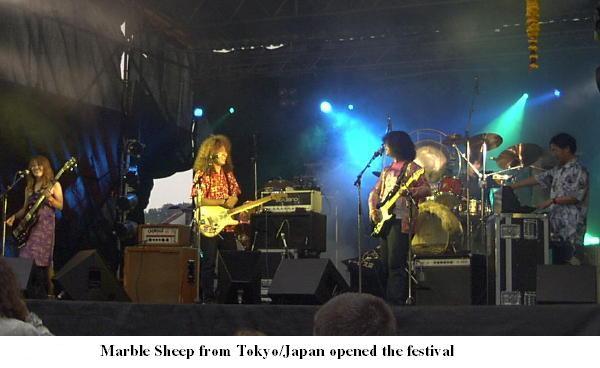
From Aural Innovations #21 (October 2002)

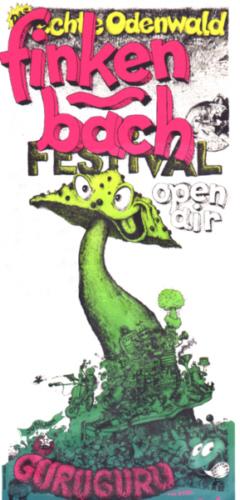 The small village of Finkenbach ("finch creek") in South Western Germany has learned to live with the fact of being the host for one of the last large Hippie festivals in Germany. The festival took place for the first time in 1975 and from then on almost annually, this year on July 26th and 27th. What does the term Hippie festival mean today? Are there still Hippies in Germany and you just don't notice them unless you visit Finkenbach or Burg Herzberg, where a similar annual festival takes place? Is it a nostalgic veteran meeting? And what about the music they're playing there? Is it still the psychedelic "krauty" rumble Rock of the Seventies? In order to anticipate it: The answer is yes and no at the same time. Yes, there are still Hippies, and also yes, there were many visitors who had recognizably dressed up as Hippies with the corresponding garments and accessories. But there were also many young and very young ones which one would rather suspect in completely different scenes - what concerns clothes and presentation, trousers with the step in knee height, tattoos and piercings. Yes, with Guru Guru and Birth Control genuine Krautrock veterans stood on the stage but nothing more has "rumbled". Their musical repertoire was modernized cautiously and was performed liquidly and professionally. The Hamburg Blues Band presented Blues based mainstream Rock, and were supported by legends of the Seventies' progressive music, Dick Heckstall-Smith and Mike Harrison. Yes, and there was also completely different music: Marble Sheep from Japan played really fresh Psychedelic Rock, with the Space Hobos an experienced fun and party band was on stage, there was Reggae, Ska and related Carribean sounds presented by Dr. Woggle an the Radio and by Wally Warning, and Lover 303 closed the Festival with Trance Techno of the finest kind. And all this means a clear "no" to many common prejudices concerning "modern Hippies" at this festival and other festivals like the one in Finkenbach.
The small village of Finkenbach ("finch creek") in South Western Germany has learned to live with the fact of being the host for one of the last large Hippie festivals in Germany. The festival took place for the first time in 1975 and from then on almost annually, this year on July 26th and 27th. What does the term Hippie festival mean today? Are there still Hippies in Germany and you just don't notice them unless you visit Finkenbach or Burg Herzberg, where a similar annual festival takes place? Is it a nostalgic veteran meeting? And what about the music they're playing there? Is it still the psychedelic "krauty" rumble Rock of the Seventies? In order to anticipate it: The answer is yes and no at the same time. Yes, there are still Hippies, and also yes, there were many visitors who had recognizably dressed up as Hippies with the corresponding garments and accessories. But there were also many young and very young ones which one would rather suspect in completely different scenes - what concerns clothes and presentation, trousers with the step in knee height, tattoos and piercings. Yes, with Guru Guru and Birth Control genuine Krautrock veterans stood on the stage but nothing more has "rumbled". Their musical repertoire was modernized cautiously and was performed liquidly and professionally. The Hamburg Blues Band presented Blues based mainstream Rock, and were supported by legends of the Seventies' progressive music, Dick Heckstall-Smith and Mike Harrison. Yes, and there was also completely different music: Marble Sheep from Japan played really fresh Psychedelic Rock, with the Space Hobos an experienced fun and party band was on stage, there was Reggae, Ska and related Carribean sounds presented by Dr. Woggle an the Radio and by Wally Warning, and Lover 303 closed the Festival with Trance Techno of the finest kind. And all this means a clear "no" to many common prejudices concerning "modern Hippies" at this festival and other festivals like the one in Finkenbach.
The Finkenbach festival is a sociological phenomenon of its own kind. Many people still think that - as the former Guru Guru festival - the whole thing is organized by Mani Neumeier, the founder and leader of Guru Guru who lives in Finkenbach, alone. Actually, however, the festival is a community product of the municipality of Finkenbach. The mayor is a member of the organizing board as well as representatives of the local sport and singing clubs and the voluntary fire-brigade. This also means that the municipality benefits from the festival solidly: A soccer field, a sports hall and and a house for the younger members of the fire-brigade could be built from the festival earnings of the municipality and the clubs. "The time of the festival is a state of emergency for the village", the landlady of a local restaurant explained, "but we can get along with it": There was a special menu for the festival days, with moderate prices, many small dishes and vegetarian-alternative meals, which rather do not belong to the local plain food. "The village", adds her husband, "faces the festival positively altogether, some new citizens excluded. That the scene of the visitors and their characteristics are accepted by the village, is Mani Neumeier's work alone", as he sees it. There was also not a bit of hippie-like amateurishness concerning the technical and logistical aspects of the festival. The sound and stage technicians were experienced with live events for large television stations. A neighbour of Mani, as he introduced himself, said that he helps him a little with the organization. When I met him a few days later in my city by coincidence, it turned out that he is a well-known concert organizer in his main profession... Technically and organizationally everything went smoothly, on the stage and on the festival area but also in the village as well. After bad and visitor-deterring experiences with the police in the past, this year a private security service had been engaged as the order-keeping power, which "intercepted" visitors on all roads to Finkenbach, which meant that they sold respectively controlled tickets and were leading the visitors to the festival area. On the festival ground itself security personnel could be seen only on the evening before the festival started where they also checked the musicians of the booked bands whether they would have tickets... The next day the festival area was free of security guards and the entrance was checked by helpers of the local clubs involved. The police nevertheless were there: not openly visible and not in an immediate proximity of Finkenbach but at all radial roads, where they checked every car that was a little older with long-haired passengers, and many of those visually suspicious for being "different" had to undergo a blood and hair test.
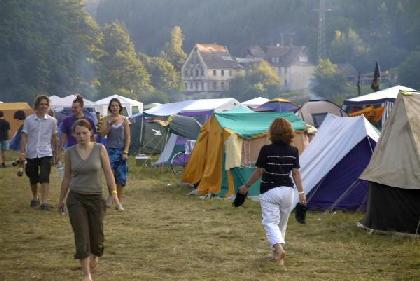 Not with all meetings these days was the contact of the "different cultures" so glaring. On the main street native fathers with children on bicycles mixed up with the festival visitors, a mother with a caravan full of children was looking for the way to her usual parking lot that became a part of the festival area; I was asked by someone from the neighboring village, where this week the savings bank bus would be parking... The visitors on the festival area represented a mixture of different subcultures: Persons of the type of "teachers grown older" next to rockers, freaks and wearers of hippie icons like batik shirts, shepherd bags and mussel chains. The festival area resembled a mixture of a boy scout camp, a flea market and a village fair. Many camping tents were decorated with flags showing Che Guevara, Bob Marley or totems of the Native Americans, camp fires were glowing in front of the tents, and songs of the Sixties sung by young voices were accompanied by guitars out of tune. Those who ever had the feeling to miss pictures, garments or accessories from the Seventies had the opportunity to re-buy them in one of the many bazaar tents. And among this were the professional marquees and food and beverage booths of the local clubs that were so well occupied and organized that no queues or longer waiting periods developed. The place before and behind the stage was strictly under control of Mani Neumeier on the eve of the festival. He cared about every detail of the stage and concert organization, where which car had to be placed, where the backstage tents and the sales booths next to the stage had to be positioned and how the garland for the stage decoration - more then twenty yards long and made of genuine blooms - would hang best. The alternative between two or three even bends had been discussed for a quite a while, when Mani finally decided in favor of two bigger bends at the outsides and a small one in the middle... This area also served as a meeting point for people active in the scene: Piet, the manager of the German record label "Fuenfundvierzig" ("forty-five"), Björn Münz aka "Papa Bear", author of the book "33 Years High Times with Guru Guru" (available in German only), Ken Matsutani, band leader of Marble Sheep and boss of the Japanese record label "Captain Trip" and his band mates, Sati, responsible for public relations work for the Danish Roskilde festival in Germany and for their German home page, Peter Kuehmstedt, bass player of Guru Guru in the role of a stagehand and co-organizer; the musicians of Kraan who are regular vistors of the festival even if they don't play were missed until someone said that he knew that they were in the US for a festival tour...
Not with all meetings these days was the contact of the "different cultures" so glaring. On the main street native fathers with children on bicycles mixed up with the festival visitors, a mother with a caravan full of children was looking for the way to her usual parking lot that became a part of the festival area; I was asked by someone from the neighboring village, where this week the savings bank bus would be parking... The visitors on the festival area represented a mixture of different subcultures: Persons of the type of "teachers grown older" next to rockers, freaks and wearers of hippie icons like batik shirts, shepherd bags and mussel chains. The festival area resembled a mixture of a boy scout camp, a flea market and a village fair. Many camping tents were decorated with flags showing Che Guevara, Bob Marley or totems of the Native Americans, camp fires were glowing in front of the tents, and songs of the Sixties sung by young voices were accompanied by guitars out of tune. Those who ever had the feeling to miss pictures, garments or accessories from the Seventies had the opportunity to re-buy them in one of the many bazaar tents. And among this were the professional marquees and food and beverage booths of the local clubs that were so well occupied and organized that no queues or longer waiting periods developed. The place before and behind the stage was strictly under control of Mani Neumeier on the eve of the festival. He cared about every detail of the stage and concert organization, where which car had to be placed, where the backstage tents and the sales booths next to the stage had to be positioned and how the garland for the stage decoration - more then twenty yards long and made of genuine blooms - would hang best. The alternative between two or three even bends had been discussed for a quite a while, when Mani finally decided in favor of two bigger bends at the outsides and a small one in the middle... This area also served as a meeting point for people active in the scene: Piet, the manager of the German record label "Fuenfundvierzig" ("forty-five"), Björn Münz aka "Papa Bear", author of the book "33 Years High Times with Guru Guru" (available in German only), Ken Matsutani, band leader of Marble Sheep and boss of the Japanese record label "Captain Trip" and his band mates, Sati, responsible for public relations work for the Danish Roskilde festival in Germany and for their German home page, Peter Kuehmstedt, bass player of Guru Guru in the role of a stagehand and co-organizer; the musicians of Kraan who are regular vistors of the festival even if they don't play were missed until someone said that he knew that they were in the US for a festival tour...
Beginning on Friday evening music played the main role. Marble Sheep had the task of opening the festival - a difficult and ungrateful situation for every band - and they did it brilliantly. A smart intro from a tape deck in the style of an airport announcement that declared the arrival of psychedelic Rock from Japan, followed by the hit-suspicious opener "Inside Out" that started a fireworks-like sequence of precisely played songs which combined instrumental and vocal experience, great enthusiasm and delicate musical humor. It wasn't only the line up with two drummers that brought a Westcoast atmosphere to the festival; their tunes had a flowing ease and gave room for impressive solos, duets of the two guitarists Ken Matsutani and Brown'nose No. 2 and other instrumental showpieces. For Marble Sheep it was their first show outside Asia - actually embedded in a common vacation trip of the band members and "Captain Trip" employees - with a noticeable nervousness at the beginning of the concert, but their set ended at a world class level. Intro and first piece followed again at the end of the concert and completed the general impression of a "framed" illustrated broadsheet. Marble Sheep have played about 200 concerts and released two live and one studio CD. Ken Matusani, the band leader and composer of most of their songs, sees their examples in the German bands Can, Amon Düül II, Neu! and Guru Guru, the U.S. psychedelia and the New York Dolls ("as if the New York Dolls would play in the style of Pink Floyd", as Ken pointed out in a little after show interview). The idea of playing with two drummers by the way doesn't go back to the obvious example of the Grateful Dead but to the British Seventies' band Pink Fairies.
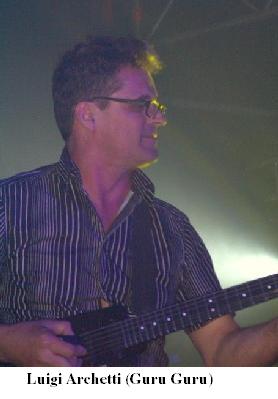 Guru Guru were already the second band of the first night. Anyone who knew them only from their records and CDs was surprised by the power, enthusiasm and musicality of a set that had nothing to do neither with the early "helter skelter" type records "Ufo" and "Hinten" nor with the rather pop style "2000 Gurus". Instead there was an overall picture of their works in a form "worked-through" - whoever interprets this in a Freudian way, isn't so wrong either: The band met the challenge of their 34-years' history as a Krautrock institution, and didn't copy themselves. Every solo, every break, every little musical madness had a new tension of its own, as if they were played in this form for the first time this evening. Every solo was a "risk", each rhythm change could be a simple rhythm change within a tune or could lead to the next piece. It was as if four people would say at the same time: "Now, we're telling you a story", and what would have lead to chaos if spoken has worked in musical form. Mani Neumeier on drums and extensive percussion, Luigi Archetti on guitar, Roland Schaeffer on guitar and various wind instruments and Peter Kuehmstaedt on bass have proved that they not have had their day, but that they still have drive, wit and fresh ideas, and that they could evoke something precious besides the usual reactions of the audience after a successful concert: gratitude and inner joy.
Guru Guru were already the second band of the first night. Anyone who knew them only from their records and CDs was surprised by the power, enthusiasm and musicality of a set that had nothing to do neither with the early "helter skelter" type records "Ufo" and "Hinten" nor with the rather pop style "2000 Gurus". Instead there was an overall picture of their works in a form "worked-through" - whoever interprets this in a Freudian way, isn't so wrong either: The band met the challenge of their 34-years' history as a Krautrock institution, and didn't copy themselves. Every solo, every break, every little musical madness had a new tension of its own, as if they were played in this form for the first time this evening. Every solo was a "risk", each rhythm change could be a simple rhythm change within a tune or could lead to the next piece. It was as if four people would say at the same time: "Now, we're telling you a story", and what would have lead to chaos if spoken has worked in musical form. Mani Neumeier on drums and extensive percussion, Luigi Archetti on guitar, Roland Schaeffer on guitar and various wind instruments and Peter Kuehmstaedt on bass have proved that they not have had their day, but that they still have drive, wit and fresh ideas, and that they could evoke something precious besides the usual reactions of the audience after a successful concert: gratitude and inner joy.
Next on stage were Birth Control. The audience in front of the stage got thicker, the expectation joy increased, the night approached its high point. And Birth Control could meet the expectations. The withdrawal from the "rumbling" of the early records was solved quite differently than did Guru Guru, however: The songs were the old ones but had the quality of modern studio productions, and were performed by really experienced considerably younger musicians around the singing "drum legend" Bernd Noske. And the concept worked: What Rainer Wind on bass guitar, Peter Engelhardt on guitar and Sascha Kühn at the keyboards put together was really convincing. Bernd Noske, full of soul and joy, one more time could play the game of his life as the boss of Germany's best live band, and the audience raged and came fully at their expense. What was missing however, at least in my opinion, was the air of self-exposure, the impression of the responsibility for a piece of Rock history that Guru Guru still carried with the risk of failure and the possibility of the exposure to ridiculousness for some, and which they made audible and visible that night. Birth Control in contrast are mutated to the advanced culture - still in seven hundred years their new arrangements will be performable on then historical instruments. Guru Guru remained alternative culture; they met their past authentically, but didn't prepare their "immortality". But this again is my personal opinion - if the festival would have had a "winner" that would have clearly been Birth Control.
The rest of the night was a party. Not that one would get the wrong idea from the band name Space Hobos and even would expect a Space Rock band, said Mani Neumeier at the announcement of the last band of the evening. No, he had booked the Space Hobos because they spread good mood and because they would have a "randy drummer". "Randy" drummer, allright! And what about the "randy" bass player and the not less "randy" singer and guitar player? So: Tara, the drummer, was drumming pretty well and would indeed have broken all sales records in every bar in the world this night at her appearance and in her thoroughly provocative presentation. Cynthia, the bass player, played exactly the type of song supporting bass that is known by female top bass players like Tina Weymouth, Anne Tkach or Melissa Aufdermaur, and she would undoubtedly have the looks to appear as a model in an advertisement for bass guitars. Despite the class of his co-musicians the best "man" on stage - not only because he was the only one - was "Space M. Pfeffer" ("Pfeffer" = "pepper"), the singer and guitarist. With the voice and the appearance in the style of Austin Powers he lead through a "potpourri" throughout the history of popular music - among their tunes were Abba's "Waterloo" in waltz time, Beethoven's "Fifth", popular TV melodies, ACDC's "Highway to Hell" and Hawkwind's Space Rock anthem "Silver Machine". Everything in tight and plausible arrangements of classic "three man" bands, style proof even at the kitschiest moments. The "climax" of the set was Serge Gainsbourg's "Je t' aime (Moi non plus)" (a big hit in Europe in the Sixties), underlaid with the most beautiful feigned orgasm since "When Harry met Sally" by the drumming Tara. Altogether exceptional for a festival of "progressive" music but also this band clicked with the audience fantastically and provided an excellent conclusion of the first night.
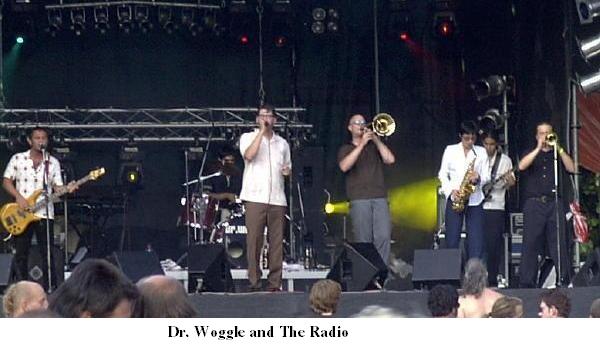
Saturday started as a hot high summer's day, and the festival had "settled" itself: Visitors were strolling around the stands, children and dogs played between the tents, and the Finkenbach, the creek that gave its name to the village of Finkenbach, meandered on the edge of the festival area and invited everyone to take a bath. Almost imperceptibly the set of Dr. Woggle & The Radio started a suitable underpainting of Ska and Reggae. Dr. Woggle & The Radio are a local semi-professional students' band that spread a relaxed party feel. Their line-up with a complete brass section and a nearly academic instrumental control allowed them also to perform a Reggae style, that had almost been lost completely already besides Bob Marley's Rock style Reggae and later due to the Neo Dub of the Techno and Dancefloor scene: The Ska ot the Fifties and the early Sixties had a strong proximity to the classical jazz, a rhythm section laid the fundation and the melody instruments had their soloistic parts in turn. Pieces of the Skatalites, until today the most important representatives of the Jamaican "old school" Ska, other suitable "historical" compositions and own works together with political lyrics as it was common for the early authentic Ska and Reggae.
The fact that Reggae is a complete universe of its own was clarified by Wally Warning, guitarist and singer from Aruba, one of the Netherlands Antilleses in front of the coast of Venezuela. Together with Ronny Cairo, bassist, guitarist and singer from Aruba, Andy Weeks from Barbados at the drums and Carter Freeman from the USA at the keyboards, he succeded to connect Caribbean heat, political and religious longings for peace, liberty and justice with warm-hearted musicality. The Quatro, rather known as a children's guitar, is a "real" instrument somewhere between guitar and ukulele and underlined the charm of its voice. Unfortunately, it was during his set, the calmest and most peaceful of the entire festival, that some visitors got off the track. Some white boys with dreadlocks lost the regard for the persons around them while dancing in front of the stage, two or three bottles and glasses flew onto the stage and into the audience, not really dangerous but quite uncomfortable for the musicians and for those who were watching the show right in front of the stage. After a short speech of Mani Neumeier, however, the self adjustment ability of the audience worked again and the show could be continued.
The third band on the second night was the Hamburg Blues Band. Hardly anyone was prepared for what would happen on stage as this band is better known in the northern part of Germany where they are touring regularly. With Gert Lange on vocals and guitar, Alex Conti on lead guitar, Bexi Becker on bass and Hansi Wallbaum at the drums the first guard of German Rock performers was on stage, after some tunes from their own current CD they were accompanied by the saxophone legend Dick Heckstall-Smith, who had played with John Mayall's Bluesbreakers and with Collosseum, and Mike Harrison, the voice of Spooky Tooth. In their set they made clear what let Rock Music become the dominant genre of popular music for more than three decades. Clear musical and textual statements, never trivial despite four step beat and the Blues format, vocalistic and instrumental showpieces and a high competence of professional practice - perhaps so clearly recognizable with any other German band. The overwhelming success of their show was surely favored by the choice of the repertoire they played that night. Many of the tunes of Spooky Tooth are timeless anthems and were familiar to the audience even if many of them didn't know the titles of the tunes and the name of the original band, as pieces like "Waiting for the Wind", "That was only Yesterday" and "Better by You, Better than Me" are still played on the radio occasionally (at least in Germany).
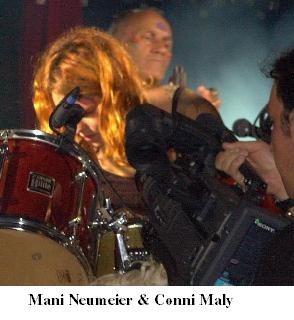 With the announcement of the last band Mani Neumeier expressed himself in a roundabout way. Already last year he had tried to bring something completely different on stage, and the local clubs involved in the festival, even the mayor of Finkenbach, would have asked whether again this year the last band could be... and the rest of his announcement went down in the applause. On stage came Conni Maly, guitarist, drum machine and electronic specialist, Mani Neumeier at the "real" drums and Luigi Archetti, guitarist with Guru Guru and together with Mani active in the duo "Tiere der Nacht". In 2001, Mani Neumeier and Conni Maly had presented the CD "Modern Fairytales" under the name "Lover 303", a Dance-Trance-Goa-Techno-Rock project that is quite successful in the respective scene and earned them lots of live performances in discotheques and at dance events. Together with Archetti, who played the hard Techno riffs that usally come from sound samplers live with his guitar, they could show that Techno must not necessarily be labeled by blunt brutal beats, but can be presented as a subtly differentiated art. The show was quite spectacular: in the stage background a dragon made of papier-mâché was vomiting artificial smoke, black light lightning chopped the night, an acrobat juggled with real fire, and finally a role exchange: Conni Maly took over Mani Neumeier's drums and he operated her Techno tools. The audience raged but was exhausted in the end like a kitten with which one had played for a long time.
With the announcement of the last band Mani Neumeier expressed himself in a roundabout way. Already last year he had tried to bring something completely different on stage, and the local clubs involved in the festival, even the mayor of Finkenbach, would have asked whether again this year the last band could be... and the rest of his announcement went down in the applause. On stage came Conni Maly, guitarist, drum machine and electronic specialist, Mani Neumeier at the "real" drums and Luigi Archetti, guitarist with Guru Guru and together with Mani active in the duo "Tiere der Nacht". In 2001, Mani Neumeier and Conni Maly had presented the CD "Modern Fairytales" under the name "Lover 303", a Dance-Trance-Goa-Techno-Rock project that is quite successful in the respective scene and earned them lots of live performances in discotheques and at dance events. Together with Archetti, who played the hard Techno riffs that usally come from sound samplers live with his guitar, they could show that Techno must not necessarily be labeled by blunt brutal beats, but can be presented as a subtly differentiated art. The show was quite spectacular: in the stage background a dragon made of papier-mâché was vomiting artificial smoke, black light lightning chopped the night, an acrobat juggled with real fire, and finally a role exchange: Conni Maly took over Mani Neumeier's drums and he operated her Techno tools. The audience raged but was exhausted in the end like a kitten with which one had played for a long time.
And then - almost all of a sudden - everything was over. Half an hour after the last tone one could see Mani Neumeier strolling over the festival area arm in arm with his girlfriend, visitors were saying good bye or arranging common journeys back home, the stage was already partly dismantled. On the next day I almost didn't catch my train because of the police controls, the serious appearance of my hotel host who drove me to the station saved me an inspection. At the station I met the members of Marble Sheep again who continued their "European tour" as a private vacation trip. They left the train in Heidelberg to see Berlin, Amsterdam and Cologne. Finkenbach was something like an excursion into another world. At home I found out that my computer had broken down in the meantime - I was back in "real life".